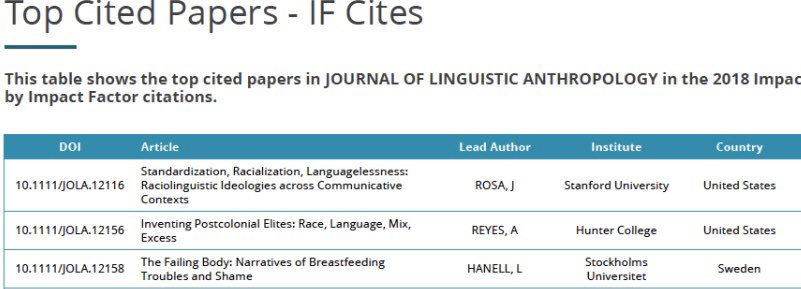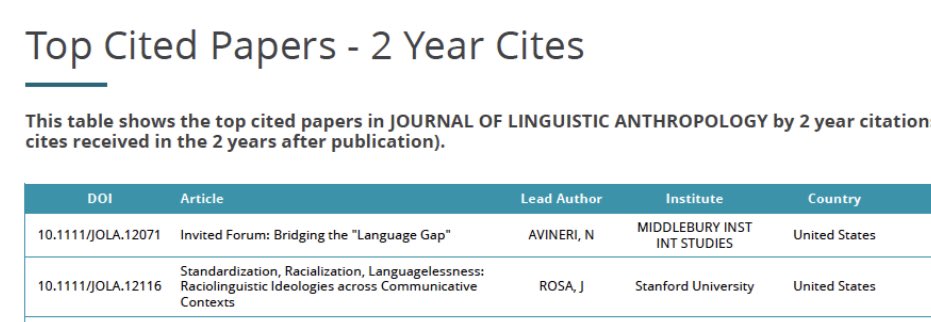This weekend I learned a manuscript I once submitted to a flagship anthropology journal, which was trashed bc it allegedly lacked empirical evidence to support my claims about racial & linguistic abjection, was the top-cited Journal of Linguistic Anthropology paper in 2018  https://abs.twimg.com/emoji/v2/... draggable="false" alt="😎" title="Smiling face with sunglasses" aria-label="Emoji: Smiling face with sunglasses">
https://abs.twimg.com/emoji/v2/... draggable="false" alt="😎" title="Smiling face with sunglasses" aria-label="Emoji: Smiling face with sunglasses">
The frigid, combative, or altogether exclusionary initial responses to my work forced me to confront troublesome anthropological commitments to ethnographic empiricism, which sought to circumscribe claims that could be made about race & evidence that could be used to support them
Proponents of ethnographic research often champion its context-sensitive & humanizing qualities, but ethnography can deceptively reproduce positivism by narrowly stipulating what counts as relevant context & failing to interrogate scientific demarcations of humanity
In this article, “Standardization, Racialization, Languagelessness,” I argued that a school principal’s statement, “They’re bilingual...that means they don’t know the language,” reflects the illegitimacy attributed to particular racialized populations’ practices in any language
A reviewer suggested that my conceptualization of ideologies of languagelessness as racialized attributions of subhumanity was unsubstantiated & inflammatory, whereas from my perspective this was just a basic statement about the everyday degradation particular populations face
It became clear to me that this reviewer and I experienced the world in fundamentally different ways, & that the reviewer’s perspective had become institutionally enshrined within linguistic anthropology, which resulted in the aggressive, nearly immediate rejection of my work
Rather than giving up on my conceptualization of ideologies of languagelessness, I doubled down, drawing connections among attributions of racialized populations’ linguistic illegitimacy across various historical, political, economic, & institutional contexts
Hostile responses to my work on languagelessness inspired my collaboration with @nelsonlflores on our conceptualization of a raciolinguistic perspective, as well as w/ @vanessajdiaz on a new article introducing the concept of raciontologies as a critique of ethnographic empiricism
Collaborative work has sustained me in moments when it felt as though my ideas had no place in particular disciplinary spaces—I came to understand that the problem was w/normative disciplines, not my ideas, & I’m grateful to collaborators & community for continually lifting me up
This weekend I also learned that my single-authored & collaborative publications were the two top-cited pieces in the last two years in the Journal of Linguistic Anthropology (my languagelessness article & co-authored contribution w/ @nelsonlflores to a “language gap” forum)!
Early on in grad school I was encouraged to give up on linguistic anthropology because it “wasn’t working out” for me, & then asked to leave the university altogether; I’m glad I didn’t listen—these ideas mattered & I knew it
Reflecting on these experiences, I hope to contribute to the collaborative creation of a fundamentally different version of linguistic anthropology while also never reducing my work to exclusionary subfields, disciplines, & institutions—there are much bigger worlds & struggles!
If you’re interested in the articles mentioned above, you can access Standardization, Racialization, Languagelessness here: https://www.academia.edu/27980877/Standardization_Racialization_Languagelessness_Raciolinguistic_Ideologies_across_Communicative_Contexts;">https://www.academia.edu/27980877/... and my contribution with @nelsonlflores to the “language gap” forum here: https://www.academia.edu/12477028/Hearing_Language_Gaps_and_Reproducing_Social_Inequality">https://www.academia.edu/12477028/...

 Read on Twitter
Read on Twitter " title="This weekend I learned a manuscript I once submitted to a flagship anthropology journal, which was trashed bc it allegedly lacked empirical evidence to support my claims about racial & linguistic abjection, was the top-cited Journal of Linguistic Anthropology paper in 2018 https://abs.twimg.com/emoji/v2/... draggable="false" alt="😎" title="Smiling face with sunglasses" aria-label="Emoji: Smiling face with sunglasses">" class="img-responsive" style="max-width:100%;"/>
" title="This weekend I learned a manuscript I once submitted to a flagship anthropology journal, which was trashed bc it allegedly lacked empirical evidence to support my claims about racial & linguistic abjection, was the top-cited Journal of Linguistic Anthropology paper in 2018 https://abs.twimg.com/emoji/v2/... draggable="false" alt="😎" title="Smiling face with sunglasses" aria-label="Emoji: Smiling face with sunglasses">" class="img-responsive" style="max-width:100%;"/>



